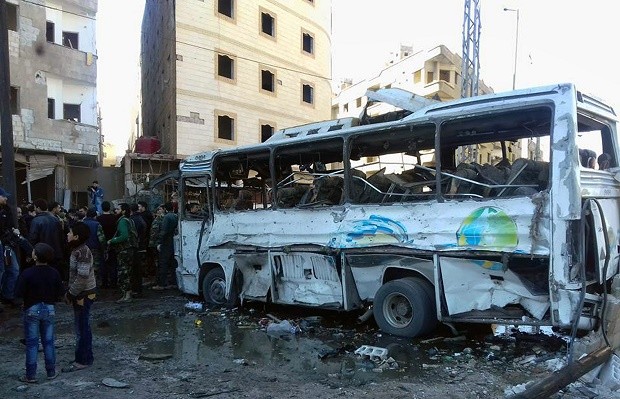ISIS bombings near Syria Shiite shrine kill 71

In this photo released by the Syrian official news agency SANA, Syrians gather where three bombs exploded in Sayyda Zeinab, a predominantly Shiite Muslim suburb of the Syrian capital, Syria, Sunday, Jan. 31, 2016. The triple bombing claimed by the extremist ISIS group killed at least 45 people near the Syrian capital of Damascus on Sunday, overshadowing an already shaky start to what are meant to be indirect Syria peace talks. AP
BEIRUT, Lebanon — Bombings claimed by the Islamic State of Iraq and Syria (ISIS) jihadist group killed 71 people and wounded dozens more on Sunday near a revered Shiite shrine outside the Syrian capital Damascus, a monitor said.
The blasts, which came as the UN’s Syria envoy struggled to convene fresh peace talks in Geneva from which ISIS is excluded, tore a massive crater in the road, overturning and mangling cars and a bus and shattering windows.
READ: Analysts: ISIS a real threat to PH | Nigerian cardinal condemns Saudi Arabia, ISIS for crucifixions of Christians
The Syrian Observatory for Human Rights, a Britain-based monitor, said 71 people were killed in two blasts near the Sayyida Zeinab shrine, including five children.
The first blast was a suicide car bomb, followed by a second suicide bomber who detonated his explosive belt when a crowd gathered, the monitoring group said.
Syrian state media earlier reported more than 50 people killed and over 100 injured in what it described as three blasts.
Official news agency SANA said the first blast was caused by a car bomb that detonated at a bus station near the shrine, which both Iran and Lebanon’s militant group Hezbollah have vowed to defend.
It said two suicide bombers then set off their explosive belts when people gathered at the scene.
An AFP photographer said the explosions damaged the facade of a nearby building, scorching all of its six storeys.
Sayyida Zeinab, south of Damascus, contains the grave of a granddaughter of the Prophet Mohammed and is particularly revered as a pilgrimage site by Shiite Muslims.
It has continued to attract pilgrims from Syria and beyond, particularly Shiites from Iran, Lebanon, and Iraq, throughout Syria’s nearly five-year brutal conflict.
Sunni Muslim extremist groups such as ISIS consider Shiites to be heretics and have frequently targeted them in attacks.
In the aftermath of Sunday morning’s attack, smoke rose from the twisted carcasses of more than a dozen cars and a bus, as ambulances ferried away the wounded and firefighters worked to put out blazes.
In a statement circulated on social media, ISIS claimed responsibility for the attacks, saying two of its members had detonated suicide bombs.
“Two soldiers of the caliphate carried out martyrdom operations in a den of the infidels in the Sayyida Zeinab area, killing nearly 50 and injuring around 120,” it said.
The area around the shrine has been targeted in previous bomb attacks, including in February 2015 when two suicide attacks killed four people and wounded 13 at a checkpoint.
– UN envoy meets opposition -Also that month, a blast ripped through a bus carrying Lebanese Shiite pilgrims headed to Sayyida Zeinab, killing at least nine people, in an attack claimed by Al-Qaeda affiliate Al-Nusra Front.
The area around the shrine is heavily secured with regime checkpoints set up hundreds of metres (yards) away to prevent vehicles from approaching.
According to the Observatory, members of Lebanon’s powerful Shiite group Hezbollah are among those deployed at the checkpoints.
Hezbollah is a staunch ally of Syria’s President Bashar al-Assad and has dispatched fighters to bolster his troops against the uprising that began in March 2011 with anti-government protests.
Early on, the group cited the threat to Sayyida Zeinab as the motivation for its intervention in Syria’s conflict.
More than 260,000 people have been killed in Syria’s conflict, which has also displaced upwards of half the country’s population internally and abroad.
It has evolved into a complex, multi-front war involving rebels, jihadists, regime and allied forces, Kurds and air strikes by both government ally Russia and a US-led coalition battling against ISIS.
In a new effort to find a political solution to the conflict, UN Syria envoy Staffan de Mistura has invited regime and opposition delegations to Geneva for fresh talks.
But while the opposition agreed to travel to Geneva after days of delays, it has so far refused to engage in indirect talks with the government.
It is demanding that UN Security Council resolutions on ending sieges and protecting civilians be implemented first.
On Sunday, the UN envoy held informal talks with the main opposition delegation, saying afterwards that he remained “optimistic and determined”.
The Damascus delegation’s chief negotiator, Syria’s UN envoy Bashar al-Jaafari, accused the opposition of being “not serious” about the talks.
RELATED STORIES
Anti-ISIS alliance to meet next week in Rome
‘Red God’ troops vow to fight BIFF














